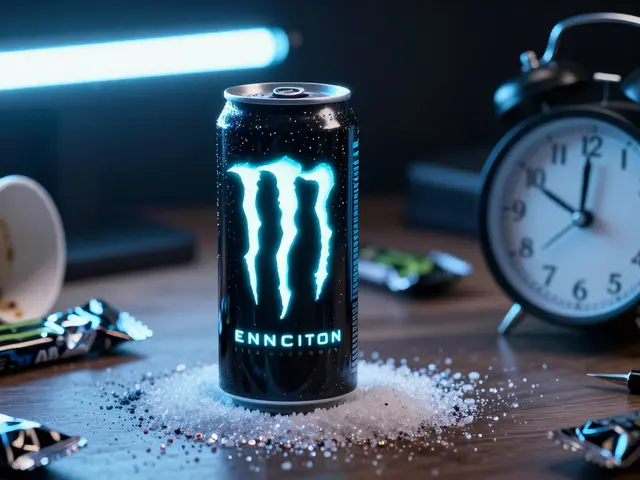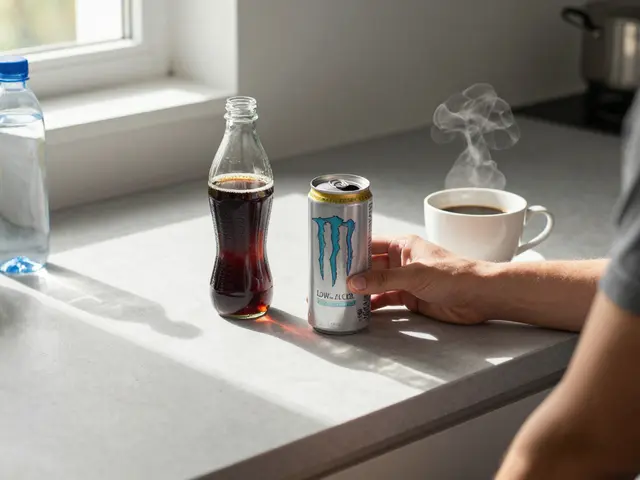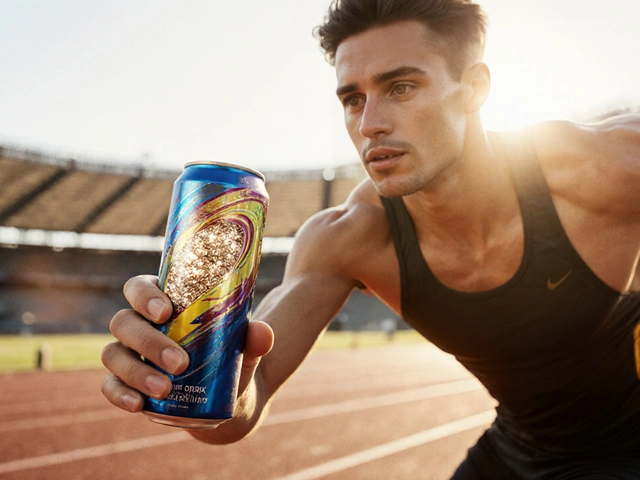The Real Deal with Energy Drinks: Should You Ditch Them?

What's Really in Your Energy Drink?
Alright, let’s uncover what’s inside those flashy energy drink cans! Ever wondered about all those ingredients listed in teeny tiny font? You might be surprised to learn that beyond the bold marketing promises, energy drinks are loaded with a cocktail of stimulants most of us can't even pronounce. The star of the show? Caffeine, often sourced from coffee beans, guarana, or even synthetic origins. Sip one can, and you may be drinking double the caffeine found in a standard coffee cup. But that's not all. While caffeine gets all the glory, there are other players at work here.
Taurine, an amino acid, is another heavy hitter. Though it sounds like it might come from bulls, it's actually manufactured artificially. Taurine helps regulate water and mineral salts in the blood and is often marketed as a performance booster. Then there’s B vitamins, thrown in to supposedly help with energy metabolism. While beneficial, they aren’t magical in these drinks. Sugar, often in high doses, along with artificial sweeteners if you’re reaching for the ‘light’ versions, crank up the calorie count and your blood sugar levels, leading to spikes and crashes.
There's also an ensemble of herbal elements like ginseng and ginkgo biloba believed to improve mental prowess. But scientific evidence confirming these claims is weak and rarely specific. Mix all these ingredients together, and you have a concoction that could do more harm than good if consumed without caution.
The Impact on Your Body
Let’s chat about what all these ingredients actually do to your body. Cracking open a can gives you an instant energy high, but it’s a short-lived joy ride. After the caffeine buzz wears off, say hello to the notorious caffeine crash where productivity sinkholes open up and the brain fog rolls in like a storm. Not just that, but all that extra sugar? Not your waistline’s best friend for sure! Consistently high sugar intake can lead to health issues like weight gain, diabetes, and heart disease.
Now, what about your heart? High doses of caffeine can stiffen up your arteries and even increase your heartbeat, creating some unease or even setting off anxiety alarms for some of us. Not to brush off the risk of caffeine addiction, which is real and can make your daily routine a jittery and anxious mess if you miss your fix. The body starts to expect this high octane boost, making it harder to stay alert naturally.
Also, don’t underestimate the toll on your liver. All these stimulants could be straining it, especially when paired with alcohol in popular party drinks. For organ health and overall wellbeing, it makes sense to carefully consider energy drink consumption.

The Science: More Than Just a Buzz?
So, do energy drinks live up to their claims? Research points to both pros and cons. Sure, they can temporarily enhance cognitive performance, especially when you’re on the brink of sleep deprivation. But it requires moderation. According to a 2021 study, regular consumption is tied to increased risks of anxiety, depression, and sleep disorders. Additionally, adolescents and teens are more sensitive than adults to these effects, being at a crucial stage of development.
Moreover, the impact of combining energy drinks with physical exercise remains controversial. Some athletes swear by it, saying it boosts performance, while others caution against heart risks and dehydration concerns. Interestingly, a 2023 meta-analysis reiterated the need for further research to pinpoint long-term effects. For instance, French researchers observed that a majority of young energy drink consumers had a higher inclination towards risky behaviors like smoking and drinking alcohol.
Evidently, while energy drinks might offer perks in certain situations, they are not without potential downsides or health risks. It’s all about balance and monitored consumption, especially with such mixed scientific reviews.
What Are The Alternatives?
Before you reach for your next energy drink, consider some natural ways to get that needed energy boost. First up, there’s the old-fashioned powerhouse — water! Sometimes feeling sluggish is simply dehydration in disguise. Grab a glass of water and see how you feel afterward. If that doesn’t cut it, how about a brisk walk or a few jumping jacks? Physical activity can shake off the tiredness and reset your focus.
For those extra tired days, a cup of green tea gives a caffeine kick minus the sugar rush. Packed with antioxidants, it can improve brain function without the harsh energy drink crash. Another alternative is a smoothie filled with fresh fruits, leafy greens, nuts, and seeds to naturally energize your day. These are nutrient-packed ways to keep health and energy levels honed.
And if you absolutely can’t drop the energy drink, try cutting down gradually rather than going cold turkey. Note the differences in your energy levels, mood, and focus. Your future self will thank you for it!
To sum it up, rethinking your energy drink habit might be a good move for your health. With so many natural alternatives out there, getting a sustainable energy boost is possible without the need for those neon-colored cans.






Comments (10)
Sara Escanciano
18 Jul 2025
Finally, someone is addressing the harsh truth about energy drinks. It’s about time people stop glamorizing these chemical cocktails without understanding the damage they cause. These products are basically a ticking time bomb loaded with caffeine and sugar, with zero regard for long-term health. They don't give you wings—they weigh you down with consequences you’ll regret later.
It’s baffling how anyone could think downing these drinks regularly is harmless. You’re literally drinking a mix that messes with your heart, spikes your blood sugar, and keeps you hooked on artificial bursts. I’m honestly shocked at how common it's become for young people, especially, to gorge on these without a second thought. We need to be stricter about educating the public on this, and better yet, promote healthier alternatives instead of excuses for poor self-care.
Isn’t it time we stopped treating caffeine-loaded sugar bombs like a lifestyle choice and started seeing them for the health hazard they really are? Enough of this nonsense about ‘energy boosts’—the real deal is these drinks are doing far more harm than good.
Elmer Burgos
20 Jul 2025
I get where you’re coming from, but I think it’s important to look at this issue with a bit more balance. Sure, energy drinks aren’t perfect, but many people use them responsibly. It’s not about demonizing, it’s about understanding. For some folks, these drinks do provide a needed pick-me-up without the harmful effects when consumed in moderation.
There’s always a risk with any stimulant, but education and moderation are key. Also, I’m curious what kind of healthier alternatives the article suggests? Would love to hear some ideas that actually work in day-to-day life for busy people. Sometimes, when deadlines are looming, these are the quick fix.
So rather than ditching them completely, maybe we emphasize making informed choices rather than blanket bans. Just my two cents.
Jason Townsend
21 Jul 2025
Look I’m telling you the whole energy drink industry is sketchy as hell. Ever wonder why companies don’t want us to know what they really put in these drinks? The caffeine is just the tip of the iceberg. There’s some secret ingredients and who knows what else in there designed to keep you coming back for more. It’s not a coincidence these drinks are marketed to young people specifically.
The FDA is too cozy with the corporations. This is a big conspiracy to keep the population dependent on these sugary, artificially boosted products. You start with energy drinks, next thing you know, you’re hooked on worse stuff. It’s a slippery slope fueled by greed, not health concerns.
Anyone who thinks energy drinks are just harmless juice has been truly had by the system. Wake up people.
Antwan Holder
22 Jul 2025
Oh, the eternal dance with the elixirs of vitality. Energy drinks, those bottled promises of power, yet do they not mirror the paradox of our own existence? We chase vigor through chemicals, striving to conquer the fatigue that life drapes over our shoulders like a cloak of shadows.
Yet, in this pursuit, might we be but players in a grand cosmic jest? These elixirs grant fleeting swiftness but at what cost to our inner fortress? Is the winged effect of energy a genuine ascent or merely the illusion of altitude while the soul descends into turbulence?
Consider this: the body is a temple, and what we imbibe can either sanctify or defile its sanctum. The real deal is not just about energy but the wisdom to understand what fuels our spirit beyond mere caffeine-induced flights. A profound reflection, indeed.
Jennifer Kaiser
24 Jul 2025
This article raises important concerns that many overlook simply out of convenience or habit. Understanding the ingredients and their impacts on the body helps us take better care of ourselves rather than blindly following trends or marketing gimmicks.
It’s crucial to listen to our bodies and evaluate if the so-called energy we get is worth the possible health effects later. There’s a fine line between temporary boost and long-term damage. It requires integrity and responsibility.
I’d love to see more discussions like these in mainstream conversations because the more informed we are, the better decisions we can make. Thank you for shining a light on this topic.
TIARA SUKMA UTAMA
26 Jul 2025
Okay but I gotta ask, is it really fair to say energy drinks are all bad? Like, people rely on them for different reasons and some don’t have the time or choice for alternatives. Not everyone can just switch to green tea or whatever else some suggest.
Sometimes I feel like the conversation ignores the social and economic factors behind why people use these drinks. If someone’s pulling a double shift or studying late constantly, is it so simple to just ditch these and get more sleep?
Sure, health effects matter but context matters too. Can we talk about that more?
Marissa Martin
29 Jul 2025
I see a lot of people trying to justify the addiction to these drinks. It’s like we all know deep down they’re bad but we refuse to face it honestly. I gave up energy drinks years ago and feel so much better without them messing with my heart and mood swings.
For me, it was about respect—respecting my body and recognizing that quick fixes don’t resolve the real fatigue or stress I was experiencing. It took real effort but quitting made a huge difference. If more people actually tried to listen to their bodies instead of chasing artificial hype, they might find the real energy they seek in healthier ways.
No harm in sharing what worked for you with others.
James Winter
1 Aug 2025
Let’s not sugarcoat this. Energy drinks are a junk import ruining Canadian youth just like elsewhere. The real problem is why governments allow these corporations to push their crap without solid regulation or taxes.
Everyone is worried about trying to argue which is 'better' but the facts are clear. These drinks are designed to create dependence and profit more than health. Time to stop coddling these multinational companies and start protecting public health for once.
Anyone else think our country should be tougher on this?
Aimee Quenneville
6 Aug 2025
Ah yeah, because nothing screams "good life choices" like gulping down neon juice that tastes like battery acid with a caffeine kick. I'm all for a little pick-me-up, but these energy drinks feel like a bad joke we're all in on.
But seriously though, I get what the article’s saying and the comments too. There’s pros and cons and no one’s perfect. Just maybe don’t drink these like they’re water and you might survive longer?
And yeah, wouldn’t it be nice if we all had the luxury of grabbing a green smoothie instead? Dreams, I tell ya. Dreams.
Dmitriy Fedoseff
11 Aug 2025
Energy drinks seem to be a modern-day paradox. They promise vitality while surreptitiously sowing the seeds of exhaustion and imbalance. It’s a reflection of our society’s relentless pace—a quick drug to momentarily bridge the gap between rest and productivity.
Our cultural narrative urgently needs to shift from quick fixes toward sustainability in our energy management, valuing rest, nutrition, and mental well-being over artificial stimulants. The insights from this article foster necessary self-awareness.
I advocate for policies that not only inform but also protect consumers, especially vulnerable populations, from potentially exploitative marketing that glorifies these drinks without adequate warning. Dialogue like this is a step forward.